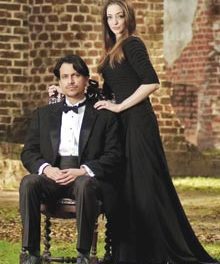MARK SHAFFER chats with the directors of 'Arsenic and Old Lace'
On his deathbed the legendary British stage actor, Sir Donald Wolfit, was asked how he felt. The irascible thespian reportedly quipped, “Dying is easy. Comedy is hard.”
Truer words were never spoken. And if they weren’t his, whoever made them up hit the nail on the head. Comedy is about timing and delivery, particularly with something like Arsenic and Old Lace, the inaugural production for the Beaufort Theater Company. The lines come fast and furious, the pace at times is nearly as insane as some of the characters and all of it depends upon an ensemble cast acting as a well-oiled comedic machine. In this case Arsenic has the benefit of two directors, Ian Sprague (who’s also playing a lead roll as Mortimer) and Jeff Evans, well known as the founder of Lowcountry Shakespeare.
“Ian knows theater and he knows how to get what he wants out of the performers,” says Dave Falls who plays Teddy in the show. “I’ve done a lot of theater with Jeff, a lot of Shakespeare. He’s got a vision. He sees the stage and the way he wants the performance to be and he can get that across to the performers. They’re both very good at it. Very good.”
Arsenic replaced the musical Joseph and the Amazing Technicolor Dreamcoat (see the accompanying story). Both directors took time out before a recent rehearsal to sit down with Lowcountry Weekly’s Mark Shaffer and talk about what they term the “panic and magic” of helming this production. Who knew they were also a comedy team?
Mark Shaffer: How do you work out the co-directing process?
Jeff Evans: We sometimes go out in the parking lot and leg wrestle.
Ian Sprague: He’s got a real mean ankle hold that he uses.
JE: Whoever gets flipped over first does not get to make the decision.
(Laughter)
JE: Actually it’s really not been a big deal.
IS: It’s been a nice split. I take care of more of the tech side and Jeff’s taken care of more of the planning, getting things done.
JE: I was out of town for a week and when I got back Ian had the thing basically blocked.
IS: Well, that was the theory.
(A brief and very funny discussion ensues regarding a certain actor’s inability to remember or write down blocking instructions)
MS: This is why they call it “Community Theater.”
JE: In every play I’ve done around here, there are people who are right on top of it. They listen, they pay attention, they make the necessary changes with you and there are always a few who are just sort of wandering around the set.
IS: And that’s the beauty of community theater – you get to bring in some of these people who have talent just waiting to be discovered and explored who wouldn’t get an opportunity otherwise. We’ve got a guy in his sixties doing his first show. That’s kind of cool.
JE: It is very cool. And the fact of the matter is that when he started this rehearsal process and when he’s done with the performance, he’ll be way better for whatever he does next.
IS: And that’s supposed to be the point of what we call community theater.
JE: We know Guffman ain’t coming.
(Laughter)
IS: Don’t dash my hopes.
JE: Another dream shattered.
MS: Once Joseph was scuttled, how was Arsenic chosen?
IS: It was a group process. There were four or five of us that sat down and rattled off a variety of shows and we kept coming back to this one knowing that it’s a name people will recognize whether they’ve seen it or not.
JE: We all came in to that meeting on a Sunday afternoon and I think the one thing we had in common was this play. You had a couple that I didn’t know –
IS: I had a couple that I didn’t know.
MS: But essentially you’re looking for something that will put butts in seats and you can cast out of the local talent pool.
JE: And something that didn’t have a cast of thirty—
IS: Or a real small cast, either.
JE: The real trick at some point will be to find [a show] we can do that requires no talent.
(Laughter)
MS: Arsenic has hung around for nearly seventy years, now. What’s the key to its appeal?
JE: It’s funny. It’s just that simple.
IS: The characters aren’t some exaggerated, melodramatic interpretation of human life. Okay, so the aunties are a little weird and it might be hard to believe they would go to those lengths, but at the same time you can sort of see how it could happen. Even Mortimer, who’s supposed to be the sane one, is a little bit off. Elaine’s a bit goofy.
JE: This is one of the few plays that come out of the period that is truly an ensemble piece.
IS: There are six or seven major parts.
When auditions failed to turn up a suitable Mortimer, Ian was asked to try out for the part.
MS: Was that a little awkward.
IS: It was awkward because I didn’t want people to think that I cast myself in the show.
JE: I do that with [Lowcountry] Shakespeare and I don’t feel awkward at all.
(Laughter)
MS: How does Mortimer feel? He’s a slow burn at first and then just sort of loses it.
IS: He’s all over the place. And I think for me that’s the challenge of the roll. One minute he’s fine, the next he’s crazy, he’s confused, he’s in love…
JE: All those changes come out of the script and the only way you can make them happen is because the script’s so well written, so sharp.
IS: There are major changes in mid-sentence.
JE: Oh yeah.
IS: The writing is just that strong.
JE: Doing the script analysis you sit down and parse every single word and you can see where these changes happen. And that’s where some of the comedy comes from – making those changes at a ninety degree angle really fast and really clean. That’s no mean feat.
MS: Like the man said, “Dying is easy. Comedy is hard.”
JE: Exactly.
IS: And luckily the way we’ve split our [directing] focus – without really having to think about it – has worked out really well.
JE: I don’t think we ever have thought about it.
IS: No.
JE: Plus these people are fun to work with. They’re excited. They’re bringing stuff to the table.
MS: Bottom line: what can people expect when they show up and spend their hard-earned cash?
JE: Hopefully they’ll walk out of the theater feeling better than they did when they walked in.
IS: Transported back to a simpler time.
JE: Thing is, if we can send a couple of hundred people out here every night having a good time–
IS: Mission accomplished.
See the feature article for information on times, dates and tickets. Get more online at www.lcweekly.com. Mark Shaffer’s email address is backyardtourist@gmail.com







